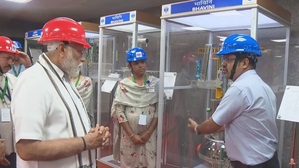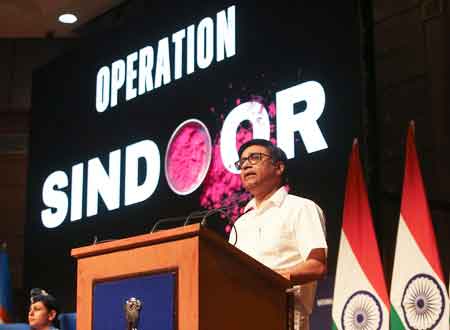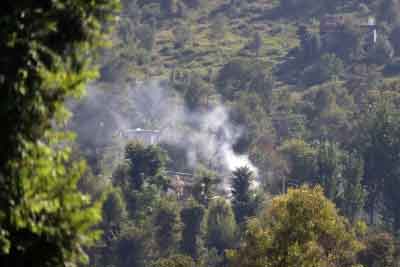Prime Minister Narendra Modi on Monday witnessed India stepping into the second stage of its three-stage nuclear power programme with the commencement of "core loading" at the first indigenous Fast Breeder Reactor (500 MWe) at Kalpakkam near here.
Upon completion of the core loading phase - which includes loading of the fuel, the first approach to criticality will be achieved, leading to generation of power subsequently.
The Prime Minister took a tour of the reactor vault and the control room of the reactor, and was briefed about its salient features.
The 500 MWe Prototype Fast Breeder Reactor (PFBR) is built by the Bhartiya Nabhikiya Vidyut Nigam Ltd (BHAVINI) with the contribution of over 200 micro, small, and medium enterprises (MSME).
Once commissioned, India will only be the second country after Russia to have a commercial operating fast breeder reactor.
The PFBR will initially use the uranium-plutonium mixed oxide (MOX) fuel. The uranium-238 “blanket” surrounding the fuel core will undergo nuclear transmutation to produce more fuel, thus earning the name ‘Breeder’.
The use of thorium-232, which, in itself, is not a fissile material, as a blanket, is also envisaged in this stage. By transmutation, the thorium will create fissile uranium-233 which will be used as fuel in the third stage. FBR is thus a stepping stone for the third stage of the programme, paving the way for the eventual full utilisation of India’s abundant thorium reserves, a government statement said.
In terms of safety, the PFBR is an advanced third generation reactor with inherent passive safety features ensuring a prompt and safe shut down of the plant in the event of an emergency. Since it uses the spent fuel from the first stage, FBR also offers great advantage in terms of significant reduction in nuclear waste generated, thereby avoiding the need for large geological disposal facilities.
Notably, despite the advanced technology involved, both the capital cost and the per unit electricity cost is comparable to other nuclear and conventional power plants.






'Operation Sindoor' a 'befitting response' to Pahalgam terror attack, says Tripura CM
Tripura Chief Minister Manik Saha on Wednesday said that India's 'Operation Sindoor' is a "befitting response" to the April 22 Pahalgam terror attack that claimed 26 lives and other such dastardly acts on Indian soil.
India exercised its right to respond to terror acts: Govt briefs the nation on 'Operation Sindoor'
India has exercised its right to respond to dastardly acts of terror emanating from the neighbouring nation, the government said on Wednesday, hours after Indian armed forces destroyed terror camps in Pakistan and Pakistan-occupied Kashmir (PoK).
India destroys JeM's Markaz Subhan Allah terror camp in Pakistan's Bahawalpur
In a major counter-terrorism offensive, India on Wednesday destroyed ‘Markaz Subhan Allah’, the Jaish-e-Mohammed (JeM) terror headquarters and training facility in Bahawalpur, Pakistan.
'Support India's right to self-defence,' Israel backs 'Operation Sindoor'
Israel has extended its support to India's right to defend itself from terrorism as Indian armed forces carried out 'Operation Sindoor' against nine high-value terror targets in Pakistan and Pakistan-occupied Kashmir.
After 'Operation Sindoor', Pakistan Army resorts to heavy artillery fire on J&K LoC
After successful targeting of nine terrorists' sites in Pakistan by the Indian armed forces on Wednesday, the Pakistan Army resorted to heavy mortar shelling on the Line of Control (LoC) for the 13th consecutive day.
World must show zero tolerance for terrorism: EAM Jaishankar
In a military operation following the Pahalgam terror attack, which claimed 26 civilian lives, India launched 'Operation Sindoor', striking nine high-value terror targets deep inside Pakistani territory.
World cannot afford military confrontation between India & Pakistan: Guterres
Secretary-General Antonio Guterres remains “very concerned” about India’s military operation against Pakistan, saying “the world cannot afford a confrontation between the two countries”, according to his Spokesperson Stephane Dujarric.
PM Modi constantly monitored ‘Operation Sindoor’ as Indian Army hit 9 targets successfully
In a major military action following the brutal Pahalgam terror attack that killed 26 civilians, the Indian Army successfully executed ‘Operation Sindoor’, hitting nine high-value terror targets deep inside Pakistan.